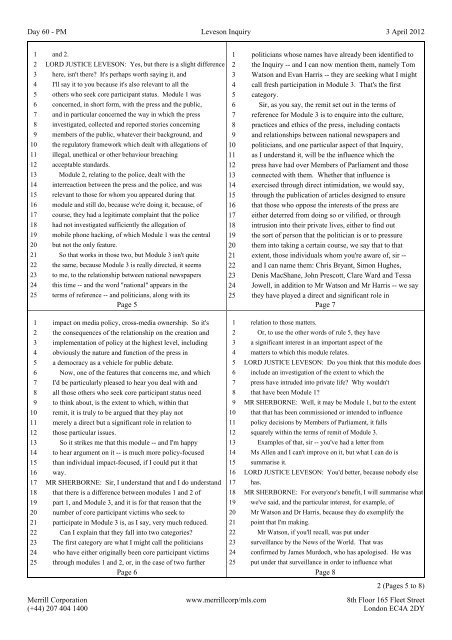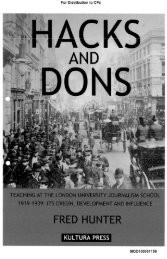Transcript of Afternoon Hearing 3 April 2012 - The Leveson Inquiry
Transcript of Afternoon Hearing 3 April 2012 - The Leveson Inquiry
Transcript of Afternoon Hearing 3 April 2012 - The Leveson Inquiry
Create successful ePaper yourself
Turn your PDF publications into a flip-book with our unique Google optimized e-Paper software.
Day 60 - PM <strong>Leveson</strong> <strong>Inquiry</strong> 3 <strong>April</strong> <strong>2012</strong><br />
1 and 2.<br />
1 politicians whose names have already been identified to<br />
2 LORD JUSTICE LEVESON: Yes, but there is a slight difference 2 the <strong>Inquiry</strong> -- and I can now mention them, namely Tom<br />
3 here, isn't there It's perhaps worth saying it, and<br />
3 Watson and Evan Harris -- they are seeking what I might<br />
4 I'll say it to you because it's also relevant to all the<br />
4 call fresh participation in Module 3. That's the first<br />
5 others who seek core participant status. Module 1 was 5 category.<br />
6 concerned, in short form, with the press and the public, 6 Sir, as you say, the remit set out in the terms <strong>of</strong><br />
7 and in particular concerned the way in which the press 7 reference for Module 3 is to enquire into the culture,<br />
8 investigated, collected and reported stories concerning 8 practices and ethics <strong>of</strong> the press, including contacts<br />
9 members <strong>of</strong> the public, whatever their background, and 9 and relationships between national newspapers and<br />
10 the regulatory framework which dealt with allegations <strong>of</strong> 10 politicians, and one particular aspect <strong>of</strong> that <strong>Inquiry</strong>,<br />
11 illegal, unethical or other behaviour breaching<br />
11 as I understand it, will be the influence which the<br />
12 acceptable standards.<br />
12 press have had over Members <strong>of</strong> Parliament and those<br />
13 Module 2, relating to the police, dealt with the<br />
13 connected with them. Whether that influence is<br />
14 interreaction between the press and the police, and was 14 exercised through direct intimidation, we would say,<br />
15 relevant to those for whom you appeared during that 15 through the publication <strong>of</strong> articles designed to ensure<br />
16 module and still do, because we're doing it, because, <strong>of</strong> 16 that those who oppose the interests <strong>of</strong> the press are<br />
17 course, they had a legitimate complaint that the police 17 either deterred from doing so or vilified, or through<br />
18 had not investigated sufficiently the allegation <strong>of</strong><br />
18 intrusion into their private lives, either to find out<br />
19 mobile phone hacking, <strong>of</strong> which Module 1 was the central 19 the sort <strong>of</strong> person that the politician is or to pressure<br />
20 but not the only feature.<br />
20 them into taking a certain course, we say that to that<br />
21 So that works in those two, but Module 3 isn't quite 21 extent, those individuals whom you're aware <strong>of</strong>, sir --<br />
22 the same, because Module 3 is really directed, it seems 22 and I can name them: Chris Bryant, Simon Hughes,<br />
23 to me, to the relationship between national newspapers 23 Denis MacShane, John Prescott, Clare Ward and Tessa<br />
24 this time -- and the word "national" appears in the<br />
24 Jowell, in addition to Mr Watson and Mr Harris -- we say<br />
25 terms <strong>of</strong> reference -- and politicians, along with its<br />
25 they have played a direct and significant role in<br />
Page 5<br />
Page 7<br />
1 impact on media policy, cross-media ownership. So it's<br />
2 the consequences <strong>of</strong> the relationship on the creation and<br />
3 implementation <strong>of</strong> policy at the highest level, including<br />
4 obviously the nature and function <strong>of</strong> the press in<br />
5 a democracy as a vehicle for public debate.<br />
6 Now, one <strong>of</strong> the features that concerns me, and which<br />
7 I'd be particularly pleased to hear you deal with and<br />
8 all those others who seek core participant status need<br />
9 to think about, is the extent to which, within that<br />
10 remit, it is truly to be argued that they play not<br />
11 merely a direct but a significant role in relation to<br />
12 those particular issues.<br />
13 So it strikes me that this module -- and I'm happy<br />
14 to hear argument on it -- is much more policy-focused<br />
15 than individual impact-focused, if I could put it that<br />
16 way.<br />
17 MR SHERBORNE: Sir, I understand that and I do understand<br />
18 that there is a difference between modules 1 and 2 <strong>of</strong><br />
19 part 1, and Module 3, and it is for that reason that the<br />
20 number <strong>of</strong> core participant victims who seek to<br />
21 participate in Module 3 is, as I say, very much reduced.<br />
22 Can I explain that they fall into two categories<br />
23 <strong>The</strong> first category are what I might call the politicians<br />
24 who have either originally been core participant victims<br />
25 through modules 1 and 2, or, in the case <strong>of</strong> two further<br />
Page 6<br />
1 relation to those matters.<br />
2 Or, to use the other words <strong>of</strong> rule 5, they have<br />
3 a significant interest in an important aspect <strong>of</strong> the<br />
4 matters to which this module relates.<br />
5 LORD JUSTICE LEVESON: Do you think that this module does<br />
6 include an investigation <strong>of</strong> the extent to which the<br />
7 press have intruded into private life Why wouldn't<br />
8 that have been Module 1<br />
9 MR SHERBORNE: Well, it may be Module 1, but to the extent<br />
10 that that has been commissioned or intended to influence<br />
11 policy decisions by Members <strong>of</strong> Parliament, it falls<br />
12 squarely within the terms <strong>of</strong> remit <strong>of</strong> Module 3.<br />
13 Examples <strong>of</strong> that, sir -- you've had a letter from<br />
14 Ms Allen and I can't improve on it, but what I can do is<br />
15 summarise it.<br />
16 LORD JUSTICE LEVESON: You'd better, because nobody else<br />
17 has.<br />
18 MR SHERBORNE: For everyone's benefit, I will summarise what<br />
19 we've said, and the particular interest, for example, <strong>of</strong><br />
20 Mr Watson and Dr Harris, because they do exemplify the<br />
21 point that I'm making.<br />
22 Mr Watson, if you'll recall, was put under<br />
23 surveillance by the News <strong>of</strong> the World. That was<br />
24 confirmed by James Murdoch, who has apologised. He was<br />
25 put under that surveillance in order to influence what<br />
Page 8<br />
2 (Pages 5 to 8)<br />
Merrill Corporation www.merrillcorp/mls.com 8th Floor 165 Fleet Street<br />
(+44) 207 404 1400 London EC4A 2DY
















